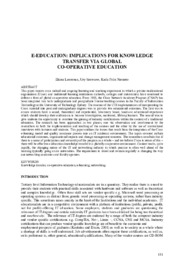E-education: implications for knowledge transfer via global co-operative education

View/Open
Date
2003Author
Lawrence, Elaine
Szewcow, Ury
Navarro, Karla Felix
Metadata
Show full item recordAbstract
This paper reports on a radical and ongoing learning and teaching experiment in which a private multinational organization (Cisco) and traditional learning institutions (schools, colleges and universities) have combined to deliver a form of global co-operative education. From 1998, the Cisco Network Academy Program (CNAP) has been integrated into both undergraduate and postgraduate Internetworking courses in the Faculty of Information Technology at the University of Technology Sydney. The essence of the UTS implementation of incorporating the Cisco material into post and undergraduate degrees was to provide two educational outcomes. The first was to ensure students have a sound, theoretical and experiential, laboratory based, hands-on educational experience which should develop their enthusiasm to become investigative, motivated, lifelong learners. The second was to give students the opportunity to combine the gaining of industry certifications within the context of a traditional
education. The research has been approached in two phases, one via observation and involvement by the researchers in both the implementation and teaching of the courses and the other by the use of unstructured interviews with lecturers and students. This paper outlines the issues that result from the integration of the Cisco e-learning model and quality assurance process into an IT academic environment. The topics covered include educational outcomes, organisational impacts and change management concerns. The researchers conclude that if there is a sense of participation and ownership of the program as a whole – and we believe Cisco is aware of this – there will be effective e-education knowledge transfer in a globally cooperative environment. Content tracks, quite rapidly, the changing nature of the IT and networking industry in which practice is often well ahead of the learning typically going on in universities. The requirement to retool and re-train regularly is changing the way
our networking academics and faculty operates.